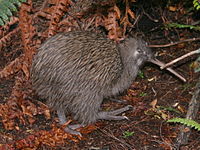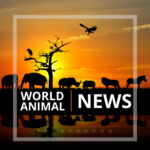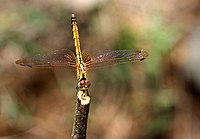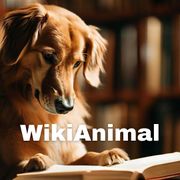Main Page
Featured article

Tokoeka are the largest of the kiwi, with males weighing up to 3.3 kg and females up to 4.2 kg. They have soft, brown feathers streaked with black and reddish brown, long pale bills, short legs and toes, and no tail. They are nocturnal, except on Stewart Island where they sometimes forage during the day. They have a keen sense of smell and use their bills to probe the ground for invertebrates, such as worms, beetles, cicadas and moths. They also eat some fallen fruit and leaves.
Tokoeka have distinctive calls that they use to communicate with their mates and to mark their territories. The male gives a high-pitched ascending whistle repeated 15-25 times, while the female gives a lower-pitched hoarse cry repeated 10-20 times.
Featured interview
Shark Conservation with Dr. Raj Sekhar Aich

Dr. Raj Sekhar Aich, a transdisciplinary human-shark researcher and artist, shares his insights and experiences regarding shark conservation, human-shark conflict, and multispecies ethnography. Discover the pioneering work of Raj as he discusses the establishment of the Transdisciplinary Human Shark Lab in Kolkata, India, and his tireless efforts to promote a holistic approach to shark research worldwide. From the Sundarbans to the shores of New Zealand, Raj research delves into the depths of human perception, advocating for interdisciplinary collaboration and cultural sensitivity in conservation efforts.
Featured animal

Delve into a treasure trove of information about elephants on the Elephant Portal. From their behavior to their intricate social structures, this portal offers a comprehensive insight into the world of elephants. Discover the latest updates on elephant conservation efforts worldwide, shedding light on initiatives aimed at protecting these magnificent creatures.
In the news

More news: Animal News | Animal Hub | Newshound
Did you know?

- At only 1 cm (⅜ in) the Antarctic midge insect is the largest land animal native to Antarctica.
- Dragonflies have existed on earth for 300,000,000 years.
- A box jellyfish has 24 eyes.
- Giant squids can be up to 18 m (59 ft) long.
- The mimic octopus can change its colour and texture to look like rocks, coral, and even other animals.
From the library

Protecting and connecting landscapes stabilizes populations of the Endangered savannah elephant is a research article published in Science Advances in January 2024. The article discusses the importance of protecting and connecting landscapes for the conservation of the Endangered savannah elephant.
Quiz
About WikiAnimal

WikiAnimal is an online knowledge base dedicated to the animal kingdom. Its mission is to offer a comprehensive and accessible resource for animal enthusiasts. Here you can find information about all kinds of animals, from mammals to reptiles, from birds to fish, from insects to amphibians. You can learn about their habitats, behaviors, diets, adaptations, conservation status and more.
You can also contribute to WikiAnimal by editing existing articles or creating new ones. Wikianimal is a collaborative project that relies on people like you to share their knowledge and passion for animals.
Join the growing WikiAnimal community in promoting knowledge, understanding, and compassion for animals.
WikiAnimal - founded Apr 10, 2023.WikiAnimal Projects
- Project Animal Talk - feature interviews and blogs from people who are passionate about animals.
- Project Newshound - Newshound is a Really Simple Syndication (RSS) retrieval platform that aggregates animal related content from various sources using RSS feeds. You can then access Newshound in a centralized location to view and stay updated on news and articles from different websites. Newshound algorithms attempt to ensure that you receive timely updates while trying to avoid overwhelming you with irrelevant information.
- Project Species - an ambitious initiative dedicated to documenting the vast diversity of life on Earth. Our mission is to create an exhaustive and comprehensive repository of knowledge about every (as many!) species of animal that inhabits our planet.